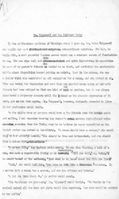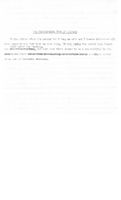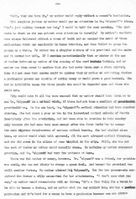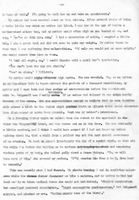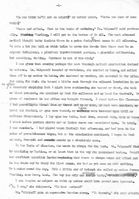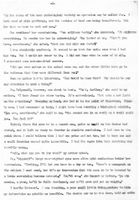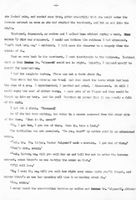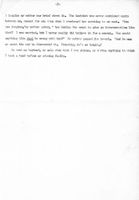The Mailer Review/Volume 11, 2017/Dr. Bulganoff and the Solitary Teste
| « | The Mailer Review • Volume 11 Number 1 • 2017 | » |
Norman Mailer
Note: “Dr. Bulgnoff and the Solitary Teste,” a short story by Norman Mailer, was never published. It is not known with certainty when Mailer wrote the story, but its date of composition is believed to be circa 1951. The Norman Mailer estate has graciously given permission to reprint the story. Images are courtesy of the Harry Ransom Center, University of Texas at Austin.
URL: https://prmlr.us/mr17mail
In the middle-class purlieus of Brooklyn where I grew up, Dr. Selma Bulganoff was easily our most extraordinary neighbor. She had, to begin with, a most powerful Russian accent which was a constant source of fascination to me. She was also tall and thin and quite high-strung in opposition to most of my parents’ friends who tended to be short, and exhibited the comfortable middle-class disposition toward putting on weight. Last in the scheme, she was a doctor which was considered an odd occupation for a woman, and she worked at it. This was during the depression and more than one married woman among my mother’s friends had been obliged to find one kind of job or another, but it was always considered a temporary measure until the husband as the classic expression of it went, got on his feet again. Dr. Bulganoff, however, obviously intended to labor in her profession until death.
On the nights when my parents would have a few friends over for cards and coffee, I can remember hearing the doctor’s nervous high-pitched voice carrying from the living room to my bedroom in eager exposition as the Danish pastry was served at ten-thirty. “A woman should have a career,” she would say in her powerful accent, “she should be free and independent, and she should live a modern life.”
“A modern life,” her husband would snort. He was also Russian, a bull of a man, who made a respectable living as an accountant. “Will you tell me, Selma,” he would demand of the audience, “just what is so passé about the life you live?”
“Lexi,” she would tell him, “you make me live like a Victorian. In a modern life a woman has a career, and she has affairs and lovers.”
“A lot you know about it,” my mother would snort.
“The Americans are backward,” Dr. Bulganoff would insist. “In Russia in the medical school all the boys and girls would live together. Ten boys would be married to ten girls.”
“Well, they can have it,” my mother would reply without a moment’s hesitation.
With complete justice my mother would pay no attention to Dr. Bulganoff’s ideas. “She’s just talking through her hat,” I would be told the next morning. “She just wants to shock so she can attract some attention to herself.” My mother’s verdicts were always delivered without a trace of doubt and so escaped the error of those evaluations which saw complexity in human behavior, and thus failed to grasp the person as a whole. My mother was a singular mixture of the practical and the naïve and it served her well. If I mention parenthetically that my sister at the age of twelve informed my mother of the meaning of the word Lesbian, and my mother was then moved to confess that she had never known such a state existed, this did not mean that anyone could be quicker than my mother at estimating whether a particular person was capable of making money or would prove a good husband. She had an infallible sense for those people who could be depended upon and those who could not.
This would make it all the more unusual that my mother should have taken me to see Dr. Bulganoff on a medical visit, if there had not been a conflict of practicalities. On the one hand, Dr. Bulganoff’s medical education had been somewhat slender. She had spent a year or two in the improvised medical schools of Russia immediately after the revolution, and had been able to practise in this country only because she had come here soon enough after the first World War to escape the more rigorous requirements of various medical boards. She had studied since then, my mother would admit with approval, all the most advanced medical theories, and she did serve in the clinic of some hospital in the city. Still, she was not the sort of doctor my mother would normally chose. In medicine my mother respected prestige, and Dr. Bulganoff had very few patients at home.
There was the matter of money, however. Dr. Bulganoff was a friend, her practise was small, she was not likely to charge a great deal. And beyond the practical was still another factor. My mother admired Dr. Bulganoff. Not for her person—she considered the doctor a silly woman—but for her attainments. “I don’t care what you say,” my mother would remonstrate my father, “it’s a fine thing for a woman to be able to become a doctor, and no matter what you say against her, she has a profession and it’s hard for a woman to have a profession because men are always jealous of that. I’m going to call her up and make an appointment.”
My mother had been worried about me that winter. After several years of being a tubby little boy which my mother had liked, I was now at the age of twelve a medium-sized skinny boy, and my mother would often sigh as she looked at me, and say, “You’re so thin now, son.” I had a succession of colds, I coughed a little bit, I ate a great deal and did not seem to gain any weight. My mother began to fear that I was suffering from malnutrition. “If only you would put on some weight,” she would remark from time to time.
“I feel all right, ma,” I would thunder with a small boy’s irritation.
“You don’t look the way you should.”
“Lea’ me alone,” I bellowed.
My mother would sigh again. She was worried. So, as no action in middle-class life is taken without its prelude of a thousand repetitions, my mother and I must have had that number of conversations before the appointment with Dr. Bulganoff was finally arranged. If my mother had delayed it was hardly because of the money. She was superstitious enough to believe that in some indefinable manner a visit to the doctor might birth an ailment which would otherwise have disappeared or never been present. Such was my mother’s prescience.
On a freezing winter night we walked down the street to the apartment in which the Bulganoffs lived, and the doctor met us at the door. She was obviously a little excited, and I think I would have sensed if I had not heard my mother talking about it, that the visit from a patient was not the most normal occurrence of an evening. It took on almost immediately the air of a social visit, so that all the while the doctor was telling me to undress and examining various parts of my body, she talked gaily about a dozen things. “Oh, we will take care of him,” she assured my mother. “I’ll examine him from A to Z, from head to toenail.”
This was exactly what I had feared. My cheeks burning I sat in small-boy nakedness while the doctor discussed me like a cadaver, and my mother nodded her head warily at those medical terms she could not understand. “Shallow respiration but excellent musculature, light consumptive predisposition,” Dr. Bulganoff chirped, and pinched my arm. “Medium muscle tone of the bicep.”
“Do you think he’ll put on weight?” my mother asked. “Maybe you know of some tonic?”
“Cause and effect. That is the basis of medicine,” Dr. Bulganoff said professionally. “Darling, I will get to the bottom of it all. The most advanced medical thought today insists there is a prima facie or first cause to all ailments. He eats a lot you tell me which helps to prove the thesis that there must be an organic deficiency, a pituitary impoverishment perhaps, a glandular malfunction, but something, darling. Sickness is not of the wind.”
I was given that evening perhaps the most thorough medical examination devised by science. Dr. Bulganoff kneaded my vertebrae, she counted my bones, and called them off to my mother in Latin, she isolated my muscles, she searched me for piles, for acne, for rash; she traced a little scab through the adjacent lymphatics in order to allay a momentary suspicion that I might have septicemia; she tapped my chest, she took my blood pressure, she examined my feet for callouses and my head for dandruff. Every piece of equipment in her office was brought forward. I stood before the fluoroscope, I had searchlights thrust down my throat and up my nose, my ears were examined, my navel was studied, my knees were hammered until my reflexes disappeared. I lay upon her table, back down, stomach down, upon my knees; I stood before posture charts and my lumbar curve was expatiated upon. In total, I was examined. I had played touch football that afternoon, and had been in the prime of pre-adolescent vigor, but as the examination continued, I began to feel as weak, decrepit and anemic as a wheelchair case.
In the logic of disaster, the worst is always for the last. Dr. Bulganoff finished by examining my Tasties, or at least that is the way she pronounced testes. Despite her confident assertion in the beginning that there is always a cause and effect and in its chain may be found the first cause, she had as yet come up with nothing. My tasties saved the day. With a little cry of triumph, she called my mother forward. “Darling, come here, look. The boy has only one solitary tasty.”
I can imagine no subject on which my mother could have proved more ignorant. “Oh, I see,” she whispered. “Is that serious?”
Dr. Bulganoff gave an expressive Russian shrug. “It depends,” she said soberly. “In the cases of the most pathological variety an operation may be called for. I have read of skin graftings, and the tasties of a dead man being transferred. But for that we have to wait and see.”
She continued her examination. “One solitary tasty,” she murmured. “It explains everything. No wonder the boy is underweight.” She looked at me. “Didn’t you know, sweetheart,” she asked, “that you had only one tasty?”
I was abominably confused. It seemed to me that for quite some time I had two. But I could not swear to it. I did not know what to make of it all. I stammered some non-committal answer.
“Did you ever notice at the school that when you and the other little boys go to the bathroom that they were different from you?”
Here my mother had to intervene. “How would he know that? Why should he pay any attention to such a thing?”
Dr. Bulganoff, however, was about to tack. “Wait, darling,” she said to my mother. “I have found the other tasty. It’s underdeveloped. That puts a new light on the situation.” Grasping my hand, she led it to the point of discovery. Since by now I had renounced my body, I might have been touching a biological exhibit. “You see, sweetheart,” she said to me, “the second one is as small as a small, small pea. You feel it?”
Indeed, there did seem to be a second one, quite as small as the doctor had stated, and it left me ready to founder in absolute confusion. I could come to the point where I could believe that I had one prize and not two, but to have one and a small fraction seemed quite incredible. I had the vague idea that something was terribly wrong.
“Well, what can you do for that?” my mother asked.
Dr. Bulganoff’s large near-sighted eyes were alive with enthusiasm behind her spectacles. “Darling, I’ll let you know in a day or two. There’s a monograph on the subject I must read, but it’s my impression that the case is to be treated by a tonic containing hormone extract. You’ll see,” she hugged my mother, “in six months, a year, he’ll be fully developed, and he’ll grow and put on weight.”
I hardly listened. I was dressing, a poor small little thing, anxious to hide my deformities as quickly as possible. The doctor saw us to the door, told my mother she looked pale, and needed some iron, added cheerfully that she would order the hormone extract as soon as she had studied the treatment, and led us out into the night.
Chastened, depressed, my mother and I walked home without saying a word. My mind was staggered. I could not believe the evidence I had witnessed. “Don’t feel bad, ma,” I muttered. I felt more the observer to a tragedy than a victim of it.
When we were back in the apartment, I went immediately to the bathroom. Instinct told me that Dr. Bulganoff could not be right. Quickly, I exposed myself to myself for examination.
I had two complete testes. There was not a doubt about it.
Then where had the missing one been? And what about the teste that had been the size of a pea. I experimented, I prodded and poked, I discovered. At will I could empty the sack of either teste. A mere poke of my finger and they could be thrust up into my body. And the pea? Examination proved that it was merely a fold of the sack.
I let out a shout, “Maaaaaa!”
As if she had been waiting, her voice in a moment answered from the other side of the door. “What is it, sonny?”
“Ma, I got two, I got two of them. Come in, take a look.”
The invitation was not accepted. “Do you, dear?” my mother said in an embarrassed voice.
“Yeah, ma. Ma, listen, Doctor Bulganoff made a mistake. I got two of them.”
“That’s nice, sonny.”
“Yeah, listen, will you call her up and tell her not to order the hormone extract, cause there’s no use wasting the money on that.”
“I’ll call her.”
“No, I mean it, ma, will you call her right away cause maybe you’ll forget, and anyway there’s no use her spending all that time reading about it.”
“Yes, sonny.”
I never heard the conversation between my mother and Dr. Bulganoff, although I imagine my mother was brief about it. The incident was never mentioned again between us, except for one time when I overheard her speaking to an aunt. “Can you imagine,” my mother asked, “her having the crust to give an interpretation like that? I was worried, but I never really did believe it for a moment. How could anything like that be wrong with him?” My mother paused for breath. “And he was so smart the way he discovered it. Honestly, he’s so bright.”
So went my boyhood, my only vice that I was skinny, my virtue anything to which I took a hand before my adoring family.

